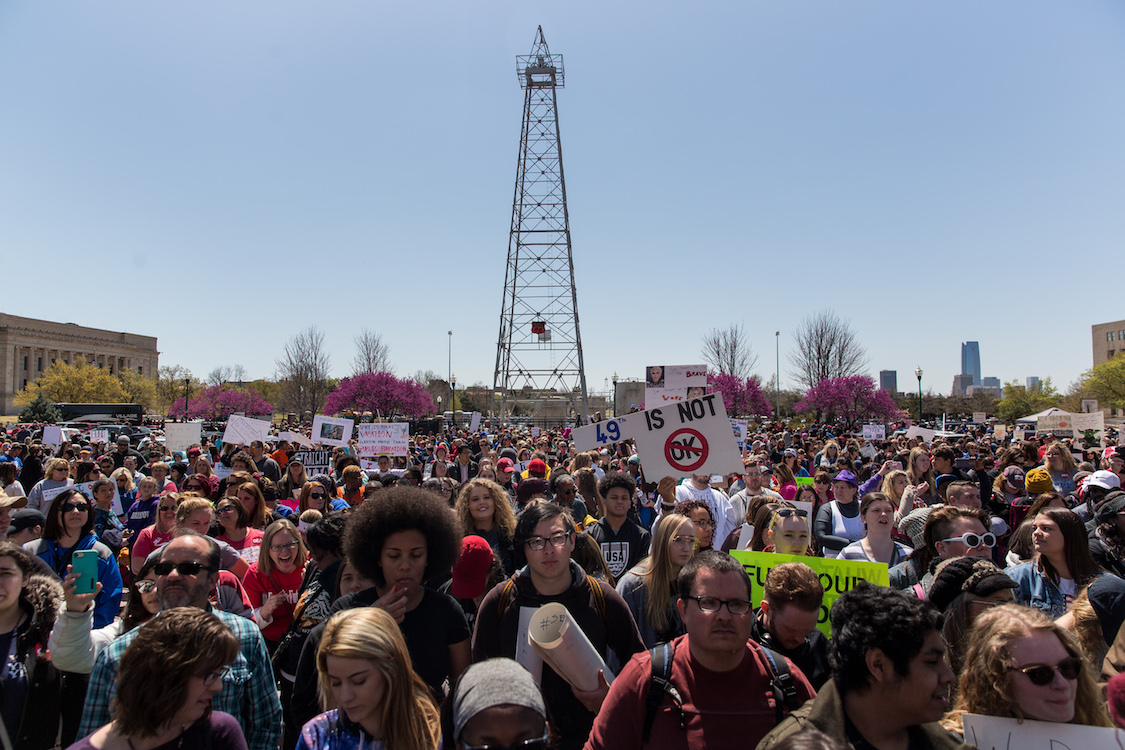CHARLESTON, WEST VIRGINIA – Teachers aren’t turning out to be the easy villains Republicans here seemed to expect.
“Growing up, you had certain people you always looked up to and teachers were one of them. Teachers, pastors — certain people you held to a higher standard and looked up to. So when this happened, it took me by surprise,” said Melissa Riggs Huffman, a 5th grade schoolteacher and the Democratic nominee for the 40th district seat in the state House of Delegates.
The state’s GOP leadership thought that a nominal raise would be enough to make school workers swallow the cut to health care benefits last spring. Instead, teachers and support personnel revolted.
Riggs Huffman and her friend Jeff Campbell, a 6th grade social studies teacher in southeastern Greenbrier County, followed the example set by teachers from coal country down south. When those folks walked off the job and showed up to the state capitol in Charleston to protest the benefit cuts proposal, just about everybody else in the system quickly joined in. On more than one day, there were enough angry educators in town to make a human ring around the entire block where the gold-domed capitol overlooks the Kanawha River.
“There are some members of the legislature who think the teachers’ unions started this. I don’t think they started it,” said Campbell, who’s running to keep the seat he was appointed to around Halloween last year.
“I think it was a really sincere grassroots thing that started in southern West Virginia counties,” Campbell said, “coal counties where those folks know what it’s like to have a labor movement.” The entire American labor movement has its roots in those counties, and almost everyone in coal country grew up hearing stories from their elders about the days when picket lines looked and acted a lot more like the military formations for which they’re named.
The state leadership had miscalculated the impact of going after teachers’ benefits. Some 280,000 people here get their health care through the state educational workers’ insurance system, Riggs Huffman said, and if elected leaders thought they were only picking a fight with teachers they were wrong.
“When I tell people, I bring home $2,000 a month to take care of my family, they look at me like really? And I’ve been teaching for 10 years now. I’m not making any money at all,” Riggs Huffman said. “But now you’re not only gonna pay us crap but you’re going to take our benefits away from us?”
The strikes ended nearly eight months before Tuesday’s election. In the time since, Campbell and Riggs Huffman and another dozen teachers around the state have been working hard, if quietly, to convert that specific mobilization into a lasting, loud voice in the legislature. Broadening the counterattack over health insurance into full-spectrum political campaigns has been draining, challenging work in some districts, as the supercharged national political divides threaten to swamp the local detail and community solidarity that the strikes demonstrated.
“People want to talk about issues on a federal level and not on a state level. I understand your concern for those issues, but that’s not something I’m going to be making decisions on. We’ve gotta focus on West Virginia and what we can do for here,” Campbell, who recently stopped watching national cable news and switched his morning info diet over to local coverage, said. “It’s hard to get people to come down to that, because the nationwide issues make it difficult to campaign. People want to fight about things you don’t have any control over. I want to talk about, how are we going to take care of our senior citizens here? How are we gonna keep people in this state, and bring jobs into this state?”
Where it used to be that federal politicians had to remember to keep one eye trained on neighborhood issues, potholes, dangerous intersections, and this or that constituent’s struggles for VA benefits, today’s teacher campaigns in West Virginia invert the old clichés. Riggs Huffman wants to talk about the sagging mountain roads the schoolbuses jangle over to get her kids to class each morning, but the people she needs to vote for her are fixated elsewhere.
“You go to them with plans and ideas for fixing stuff next door, and they want to know about the Wall or about Russia,” she said. “It’s the weirdest thing I’ve ever seen. They’re more concerned with national issues than they are with what’s going on right here at home in their own backyards.”

